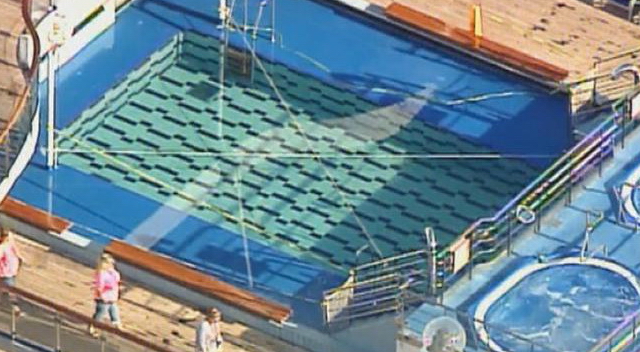Over the weekend, a 6-year-old child, who was on a 4-day cruise with his family, drowned in the swimming pool of the Carnival Cruise ship. The young child was playing with his 10-year-old brother when the incident happened at approximately 4:45 pm while the pool was open to passengers.
The Victory returned to Miami on Monday morning, and the pool was closed off to passengers with police crime scene tape. Very limited information has been made available to members of the public other than Miami-Dade Police, which is investigating the matter, has released the name of the child, Qwentyn Hunter.
According to witnesses, a person yelled over a microphone to rescue a child from the pool who was seen submerged underwater. As soon as he was taken out of the pool, chest compressions and CPR was performed, but unfortunately the boy never regained consciousness.
The family of Qwentyn was on a four day cruise, and are from Winter Garden, in Central Florida.
The question of passenger safety on cruise ships is central to every single article published in the Florida Injury Lawyer Blawg. None of these questions is more crucial than the safety of children passengers. Last March, an incident occurred on a Disney Cruise ship where a 4-year-old child nearly drowned. He sustained catastrophic brain injuries as a result of being deprived of oxygen for a significant period of time. Two weeks following the near-drowning of this child, another child died at a Disney resort in Orlando. In both instances, no lifeguards were on duty at the time.
Today, the tragic loss of Qwentyn Hunter brings the question of lifeguard presence on cruise ships back to the forefront. Should cruise ship market to families with young children and not provide basic safety to the most vulnerable? In Florida, owners of resorts owe their guests the duty to exercise ordinary care in providing a safe and proper place to bathe or swim.
Settlement Reached in Minor Child Pool Entrapment Case in Orlando Resulting in Brain Damage.
What are the responsibilities of a resort towards guests who use the resort’s swimming pool?
Generally, Florida owners get away with not hiring lifeguards if they place a conspicuous warning sign alerting all guests that there are “no lifeguards on duty”, even during pool hours. When a sign is inconspicuous and guests have the legitimate expectation that someone is watching over the swimming pool activities, owners have been found negligent.
A thorough investigation and inspection of the swimming pool of the Carnival Victory will be determinant in establishing whether Carnival Cruise Lines adequately warned its passengers of the dangers from using the pool, or whether the lack of warning contributed or caused the tragic loss of Qwentyn.
Beyond a cruise line’s obligations under the law, the question of overall safety and safety concerns for the cruise line industry remains. The three major cruise line companies, and Disney, market to families with children of all ages. Carnival, like the others, declares front and center on its website that “The safety and security of our guests is our top priority.” This phrase is typically repeated throughout the companies’ websites, TV ads, print ads, and brochures.
Yet, buried at the bottom of one single lengthy webpage, one can read: “Use of the pools : Lifeguards are not on duty; Use of the pools by guests under 13 without adult supervision is prohibited”
There appears the age-old conflict between safety and corporate responsibility. Cruise lines will continue to sell safety and dream to their guests, while inconspicuously post that they only provide minimal safety measures, which they are obligated to provide under the law. Following the law is one thing, but in many cases unfortunately, it is far from enough. And it is certainly insufficient for any business who self-proclaims to be prioritizing safety and security to market itself.
 Cruise Ship Lawyers Blog
Cruise Ship Lawyers Blog



